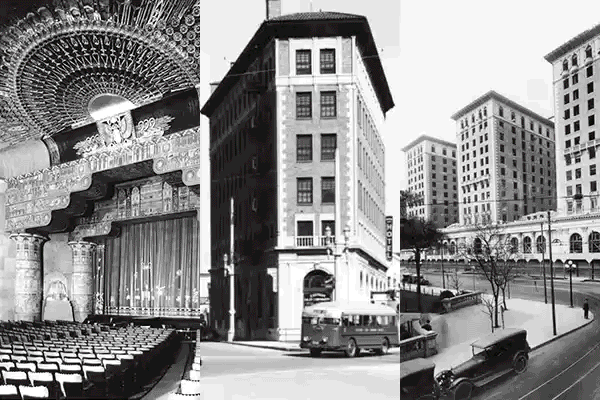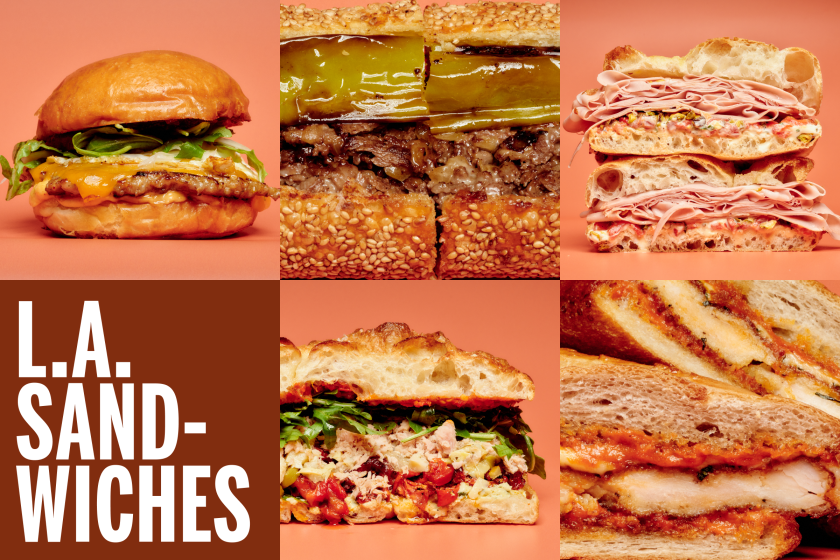Boulevard Cafe--A Hub of Black L.A.
As Frank Holoman recalls the encounter, no one in his restaurant had ever seen anything quite like it.
Jesse Jackson was ensconced at a window table in Holoman’s Boulevard Cafe, but the wave of admirers, glad-handers and star-struck fans who normally descend on the civil rights leader kept their distance.
The good reverend was in the clutches of the irrepressible Maggie Hathaway, a formidable former NAACP official who has elevated taking public figures to task to an art form. She was upset over a protest Jackson was organizing.
“Jesse sat there for five minutes and didn’t say a word--didn’t move, as Maggie continued to berate him,” Holoman said, incredulous to this day. “Jesse always has a response, but that was the first time in history I’ve seen him quiet.”
Whether it’s Jesse Jackson remaining uncharacteristically silent or Don King pulling several tables together for his entourage and ordering every entree on the menu, Holoman’s restaurant in the Crenshaw district is the place where crosscurrents in Los Angeles’ African American community intersect.
It is a landmark where media from around the world converge to take the pulse of the black community, where celebrities rub shoulders with their fans, and where political leaders forge and smash alliances over short ribs or fried chicken or catfish.
Poster-sized photos of black historical figures--Frederick Douglass, Joe Louis, Martin Luther King Jr.--peer out across the dining room from one wall. Another wall has publicity stills of a handful of the celebrities who make the cafe a regular stop--Wesley Snipes, Queen Latifah, Gladys Knight.
“More than food is served at Frank Holoman’s cafe,” said the Rev. E.V. Hill, pastor of Mt. Zion Baptist Church. “At the early-morning breakfast, you will get a projection on the world economy, war and everything else. You can meet the bootblack and bishops, assemblymen and councilmen.”
One of those bishops is Charles E. Blake, pastor of the West Angeles Church of God in Christ, who calls the cafe “one of those restaurants that is right at the very core of our being as a community. When I’m concerned about something, I can always find someone there to discuss it.”
Holoman, 64, opened the cafe on Mother’s Day 1984, after the owner of a nearby restaurant where he was a regular insulted him, he said.
He launched his restaurant in the Santa Barbara Plaza on Martin Luther King Jr. Boulevard with a blitz of advertising and promotion.
“It was a disaster,” he said. “We didn’t have the proper staffing. I thought I was hiring chefs. They were cooks.”
Holoman said he then decided to “treat the restaurant like it’s wine--let it develop in its time. So it took me almost a year to get the proper staff.”
With the right staff in place, Holoman said, the restaurant began breaking even and showing a small profit in just over a year.
A Long and Winding Road
Holoman took a circuitous path to becoming a restaurateur after arriving in Los Angeles from Kansas City in 1959 to visit his brother.
“I fell in love with Los Angeles,” he said.
A business major in college, he began applying for civil service jobs with several government agencies but was not hired despite scoring high on the tests, he said.
And the job he did land at the post office “was not conducive to me and my personality,” he said.
He spent the next four years managing a Thrifty drugstore, learning retailing, merchandising, purchasing and display. His next stop was Warner Lambert, placing pharmaceutical products in stores and taking orders.
While he was at Thrifty, one of his co-workers was always trying to get him to attend meetings of the Medgar Evers Democratic Club, but Holoman always found an excuse not to go. His co-worker said he would never bug him again about a meeting if he would come to the opening of the club’s new headquarters. Political heavyweights--Assembly Speaker Jess Unruh and county Supervisor Kenny Hahn--would be there.
Holoman went. And the meeting changed his life.
“I met a lady named Lula Jackson, about 85 years old,” he said. “She said, ‘So you’re the young man from Thrifty who’s been too busy to come to our meetings.’
“I said, ‘Yes, ma’am. I’ve been working long hours.’ ”
Jackson, “gray-haired, bowlegged and carrying a cane,” then fixed Holoman in a stern gaze and began to lecture.
“Black people weren’t too busy to blaze a trail for you to work at a place like Thrifty,” she said. “Now you’re going to tell me that you’re too busy to participate and help other people out in government who are doing things to help your race.”
Holoman said he can still see her face.
“She browbeat me for 30 minutes,” he said. “She just reamed me out from top to bottom about civil rights, about what people had done for us to be able to vote. She went all the way back to slavery. She talked to me so bad. The last thing she said was, ‘I expect to see you at the next meeting.’ ”
That meeting in 1965 or ‘66--Holoman isn’t sure which--was his first entree into politics, “and the little bug took a bite out of me,” he said.
He became a part-time administrative assistant in Unruh’s Inglewood office while still working at Warner Lambert. He went on to spend five years with Unruh as a full-time staffer.
“Jess had a great, great influence and impact on my life,” Holoman said. “He was not just a great politician. He was a great man, a caring guy.”
But Unruh, who represented a racially changing district, was nothing if not practical.
“As a new guy on the staff, I was mentioning to Jess about organizing all the Democratic clubs--all the black organizations--so that we could really make a huge difference in supporting him,” Holoman said.
Unruh told him: “Up to a point.”
“What do you mean, ‘Up to a point?’ ” Holoman asked.
“Frank, if you get them too organized and too powerful, they could kick my white ass out of office,” Unruh said.
Holoman breaks out in laughter telling that story.
“Jess was responsible for most of the black legislators in California getting elected during that time--Merv Dymally, Bill Greene, Leon Ralph, Julian Dixon, myself.”
A Run for the Legislature
Those years working for Unruh served Holoman well when he entered the Assembly in 1972. He was elected chairman of the freshman caucus that included such newcomers as Dixon, now a congressman, Los Angeles City Councilman Richard Alatorre and Supervisor Mike Antonovich.
After one term, Holoman decided to run for the state Senate, but lost to Nate Holden, now on the Los Angeles City Council. That race ended Holoman’s political career. But practically every local, state and national Democratic politician has stopped at his restaurant at one time or another. He has become a more recognizable public figure than he ever was in the Assembly.
“I’ve been interviewed on television more than 30 times,” he said. “The United States Information Agency sent journalists from 26 countries here to talk to me after the Rodney King verdict.”
A Resource for the Media
Holoman’s restaurant has become a quote factory for reporters who know they can fill their notebooks with reaction from the black community on any given story.
“During the O.J. Simpson trial, it was one of the places to be,” said Jarrette Fellows, an editor at Los Angeles’ Wave Newspapers. “A lot of movers and shakers and people in the know go there.”
Writer and social commentator Earl Ofari Hutchinson spends Sundays there with friends who “analyze everything, solve all the problems. . . . Needless to say, we leave the problems there just as unsolved as when we arrived.”
When word spread that O.J. Simpson was at the restaurant after his acquittal, nearly 500 people, by some estimates, showed up outside. The curious also gathered, but in smaller numbers, when Rodney King stopped by.
“Here you find a mix of the famous and the infamous,” barber Norman “Pee Wee” Bradley, a regular, said after finishing breakfast recently.
But for Charles Allen, who ran a video store a few doors from the cafe, Holoman “is the big draw.”
“He spends so much time going from table to table, making you feel comfortable,” Allen said.
Stella Holeman, executive director of the Black Women’s Forum, said the restaurant “feels like home, smells like home and tastes like home.”
The restaurant, Holoman said, is not the kind of place that could have been planned.
“It just happened,” he said. “This has been some kind of a lifetime experience. I don’t travel a lot. The world kind of comes to me.”
But it may not be able to come to the same location much longer now that a proposal to redevelop the Santa Barbara Plaza is wending its way through the city bureaucracy.
Holoman has his hand in another restaurant, Frank’s Place, on Rodeo Road on the approaches to Baldwin Hills. And his loyal regulars have no question about what they will do if the Boulevard Cafe is redeveloped out of existence.
Bob Boyd, 71, spoke for them all when he said: “We’ll go with Frank wherever he goes.”
More to Read
Eat your way across L.A.
Get our weekly Tasting Notes newsletter for reviews, news and more.
You may occasionally receive promotional content from the Los Angeles Times.








